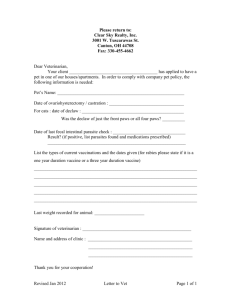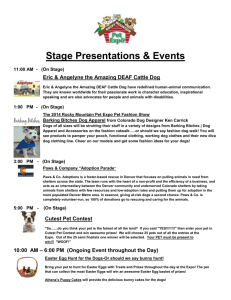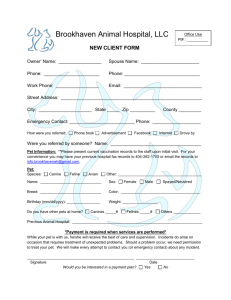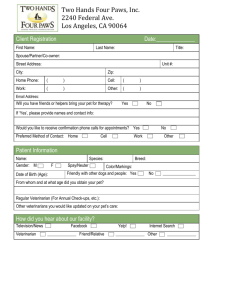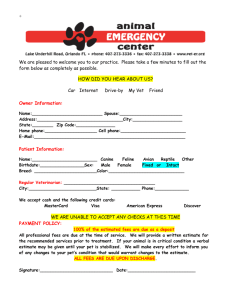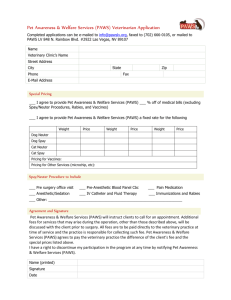Complete CGC® Testing (Optional) Although not a
advertisement
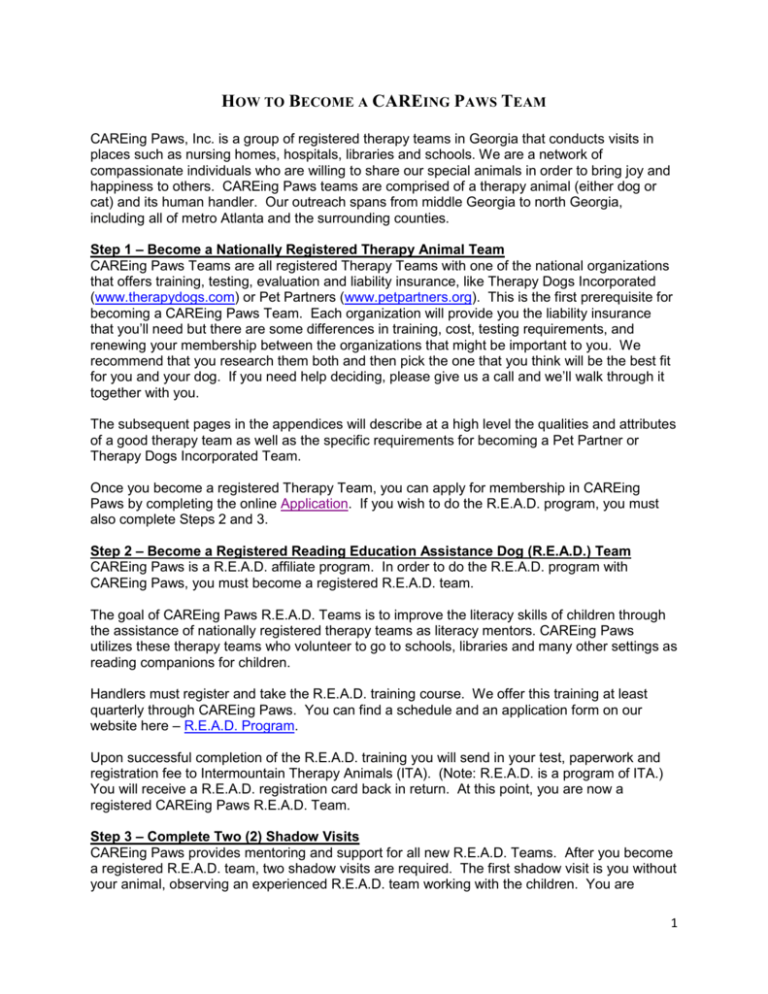
HOW TO BECOME A CAREING PAWS TEAM CAREing Paws, Inc. is a group of registered therapy teams in Georgia that conducts visits in places such as nursing homes, hospitals, libraries and schools. We are a network of compassionate individuals who are willing to share our special animals in order to bring joy and happiness to others. CAREing Paws teams are comprised of a therapy animal (either dog or cat) and its human handler. Our outreach spans from middle Georgia to north Georgia, including all of metro Atlanta and the surrounding counties. Step 1 – Become a Nationally Registered Therapy Animal Team CAREing Paws Teams are all registered Therapy Teams with one of the national organizations that offers training, testing, evaluation and liability insurance, like Therapy Dogs Incorporated (www.therapydogs.com) or Pet Partners (www.petpartners.org). This is the first prerequisite for becoming a CAREing Paws Team. Each organization will provide you the liability insurance that you’ll need but there are some differences in training, cost, testing requirements, and renewing your membership between the organizations that might be important to you. We recommend that you research them both and then pick the one that you think will be the best fit for you and your dog. If you need help deciding, please give us a call and we’ll walk through it together with you. The subsequent pages in the appendices will describe at a high level the qualities and attributes of a good therapy team as well as the specific requirements for becoming a Pet Partner or Therapy Dogs Incorporated Team. Once you become a registered Therapy Team, you can apply for membership in CAREing Paws by completing the online Application. If you wish to do the R.E.A.D. program, you must also complete Steps 2 and 3. Step 2 – Become a Registered Reading Education Assistance Dog (R.E.A.D.) Team CAREing Paws is a R.E.A.D. affiliate program. In order to do the R.E.A.D. program with CAREing Paws, you must become a registered R.E.A.D. team. The goal of CAREing Paws R.E.A.D. Teams is to improve the literacy skills of children through the assistance of nationally registered therapy teams as literacy mentors. CAREing Paws utilizes these therapy teams who volunteer to go to schools, libraries and many other settings as reading companions for children. Handlers must register and take the R.E.A.D. training course. We offer this training at least quarterly through CAREing Paws. You can find a schedule and an application form on our website here – R.E.A.D. Program. Upon successful completion of the R.E.A.D. training you will send in your test, paperwork and registration fee to Intermountain Therapy Animals (ITA). (Note: R.E.A.D. is a program of ITA.) You will receive a R.E.A.D. registration card back in return. At this point, you are now a registered CAREing Paws R.E.A.D. Team. Step 3 – Complete Two (2) Shadow Visits CAREing Paws provides mentoring and support for all new R.E.A.D. Teams. After you become a registered R.E.A.D. team, two shadow visits are required. The first shadow visit is you without your animal, observing an experienced R.E.A.D. team working with the children. You are 1 observing, asking questions, taking notes, and getting ready to read with your animal! During the second shadow visit, the children will be reading to you and your animal while the experienced handler (without their animal) is positioned nearby just in case you need help, have questions, or require assistance of any kind. You may complete as many shadow visits as you desire in order to feel confident and comfortable before volunteering alone. Step 4 – Visiting/ R.E.A.D.ing! Congratulations on becoming a nationally registered Therapy and/or R.E.A.D. Team! The last step is to determine where you and your therapy animal would like to visit and/or R.E.A.D.! CAREing Paws currently visits a number of different kinds of facilities. A complete listing of all our facilities can be found on our website at Where We Visit. In addition, certain facilities have contacted us and requested a team. You might be able to fulfill one of these volunteer opportunities – Facility Waiting List. New therapy/R.E.A.D. teams will work in concert together with a CAREing Paws Officer/Director to join an existing program, set up a new program, complete the appropriate paperwork and begin visits! Happy Visiting/ R.E.A.D.ing!!! 2 LISTING OF APPENDICES A. WHAT MAKES A GOOD THERAPY TEAM? B. PET PARTNERS C. THERAPY DOGS INCORPORATED D. HOW TO BECOME A CAREING PAWS THERAPY AND/OR R.E.A.D. TEAM E. HOW MUCH DOES IT COST? 3 APPENDIX A WHAT MAKES A GOOD THERAPY TEAM? If you are considering becoming a registered Therapy Team with your animal, here is some information for your consideration. Before you can begin the process, you and your animal must have good foundational obedience skills including a reliable “sit”, “down”, “stay”, “come when called” and “leave it”. Your animal should be able to walk at your side with a loose leash. Most importantly, you and your animal must have a great relationship! Precise obedience skills are not required, however the handler must have control of their animal at all times while visiting. You need to be observant; work together as a team; anticipate your animal’s responses, behavior and positions; and be able to redirect your animal as needed. If you feel you need more training, it is highly recommended that both you and your animal enroll in a positive-reinforcement/force free dog obedience course or therapy team preparatory course. Typical ‘Attributes of a Great Therapy Animal’: Is comfortable being crowded by a group of people People-oriented/sociable, friendly and confident Will initiate contact, stay engaged, make eye contact, and allow their behaviors to be redirected Is able to cope with stressful situations Knows how to respect personal boundaries; doesn’t jump up on people Is non-aggressive towards animals and people Is comfortable being touched, at times awkwardly Is controllable, predictable and reliable Well-mannered interactions with other animals Reliability despite distractions Ability to be cued from different positions Able to disregard food or toys on cue, i.e. with a “leave it” command Comfortable around health care equipment Typical ‘Attributes of a Great Handler’: Is friendly – makes eye contact, smiles, etc. Is a proactive advocate for their animal Is a considerate and caring leader Develops a relationship with their animal that reflects a loving partnership Prepares themselves and their animal for each visit Assesses a visit before, during and after Is attentive in all situations Knows how to enhance their animal’s abilities to be its best with the people it’s visiting The handler is aware of signs of animal stress, behaviors, and positions, and can reassure their animal with cues, or commands (as needed) to help the animal be successful. 4 APPENDIX B PET PARTNERS Pet Partners, formerly Delta Society, is an international 501(c)(3)non-profit organization that helps people live healthier and happier lives by incorporating therapy, service and companion animals into their lives. Pet Partners' Therapy Animal Handler Course (Required) Pet Partners’ Therapy Animal Handler Courses are held around the US and are taught by licensed Pet Partner Instructors. The course will allow you to learn from, and ask questions of, a team of experienced licensed instructors, plus you will benefit from interaction with classmates, discussion groups, videos, role playing and guest speakers. When you consider the number of years you intend to serve as a Pet Partner, your investment of time and cost spent taking this course is well worth building the solid foundation you’ll need to be an effective Pet Partner for years to come. The goal of the course is to fully prepare you to be the best possible Pet Partner you can be. A listing of scheduled Pet Partners' Therapy Animal Handler Courses can be found on the Pet Partner website http://www.petpartners.org/TAPinfo. For handlers who cannot attend a workshop, Pet Partners offers an online version of the Therapy Animal Handler Course. The course includes a downloadable student guide and additional support documents, with interactive activities, video, knowledge checks to reinforce learning that will help handlers understand the necessary skills to visit safely and successfully. Students that complete and pass the overall assessment will receive a certificate of completion and the registration packet. Team Evaluation The Team Evaluation process evaluates the animal/handler team; how well the handler interprets and manages the animal's behavior and how well the animal responds to the handler. The main emphasis being that the animal is under control at all times. This process is the safest way to identify acceptable visiting teams. Team evaluations are performed by Pet Partners-Licensed Team Evaluators and there are 2 parts: 1. Pet Partners Skills Test (PPST) – will show whether the animal can be controlled by the handler and follow basic commands. During the PPST, you will be assessed on how you interact with the evaluator, the evaluator's assistants, the animal, and the environment around you. 2. Pet Partners Aptitude Test (PPAT) – is designed to simulate conditions you may encounter on a visit. This screening helps determine the most appropriate environment for you and your animal to visit. During the PPAT, you will be assessed on how well you interact with the evaluator and evaluator's assistants as you simulate being on a visit. They will be role-playing as though they are in a facility. Your interactions may be in the form of questions, responses to the evaluator and evaluator's comments, eye contact, smiling, head nodding, directing the animal to interact, or other verbal and nonverbal methods of communicating. The evaluation also provides valuable input for determining which visitation environment, e.g. predictable or complex, that a team is prepared to successfully and comfortably visit. 5 Registration Packet Submission Following successful completion of the course and the team evaluation, you will submit your paperwork to Pet Partners for registration. Your registration fee covers your ID badge, ID tag for your animal and Pet Partner volunteer insurance for two years. Once you have received your badge and certificate of registration from Pet Partners, you are officially registered and are permitted to conduct visits as such. In order to remain active as a registered Pet Partner with all the benefits, e.g. insurance coverage, you must be re-evaluated every two years in order to be re-registered as a Pet Partners team. You’re well on your way to making a difference in many people’s lives, including your own, as you begin on the challenging and extremely rewarding unforgettable journey of animal-assisted activities and animal-assisted therapy. You may now also pursue other specialized opportunities with your Pet Partner such as becoming involved in hospice, crisis response, domestic violence, R.E.A.D. and the numerous opportunities that are available to Pet Partners. 6 APPENDIX C THERAPY DOGS INCORPORATED It is a goal of Therapy Dogs Incorporated to provide registration, support, and insurance for members who are involved in volunteer animal assisted activities. These activities include, but are not limited to, visits to hospitals, special needs centers, schools, and nursing homes. Our objective is to form a network of caring individuals who are willing to share their special animals in order to bring happiness and cheer to people, young and old alike. How to Become a Member of Therapy Dogs Incorporated (TDInc.) Therapy Dogs Incorporated outlines the steps to membership on their website https://therapydogs.com/Public/BecomeAMember.aspx. Here you will find information that you must read and understand prior to your test and first observation – specifically, the Member Guidelines, Member Code of Ethics and General Information and Hints & Tips. Your Tester/Observer will go over these with you to ensure a solid understanding and readiness to begin testing. Qualifications for Therapy Dogs Incorporated begin with a friendly dog, any breed or mix, and an owner/handler who has a desire to share it with those who are no longer able to own a pet, or are in a health facility separated or away from their pets. Dogs must be at least one year of age to be tested and observed. Therapy Dogs Incorporated Testing Process The process begins with a test done by a Tester/Observer in your area. You and your dog will be evaluated together as a team. This test includes a handling portion which tests your dog’s basic good manners and your handling skills. If you and your dog pass, you move to the next step of interacting with residents or strangers on three supervised visits or observations. Two of the three observations must be done in a medical facility. The third observation may be performed anywhere at the discretion of the T/O or with a child if you wish to do the R.E.A.D. program or work with children. The test and the first observation may be done on the same day. However, the second and third observation must be performed on different days. Dogs must be kept on a 4 foot or shorter leash when tested or visiting a facility. Use of a traffic lead is recommended for large dogs. Proof of current vaccinations and a negative fecal exam are required. When you’re ready to begin the process, contact a Tester/Observer (T/O) and schedule an appointment. A complete listing of T/Os can be found here https://therapydogs.com/Public/FindATO.aspx. The T/O will evaluate you and your dog together as a team. One must complement the other. Does the handler provide direction and guidance to their dog and keep their dog safe? Does the dog look to the handler to provide that direction and guidance? The T/O will give an opinion of whether or not the handler/dog team has the appropriate skills to safely interact with people in animal assisted and/or therapeutic settings. Final decision on membership will rest solely with Therapy Dogs Inc. 7 Registration Packet Submission Following successful completion of the test and the three observations, you must submit all your paperwork to the TDInc. Office. You may not participate in official visits until receiving notification and your membership package from Therapy Dogs Inc. Once you become a member, you are covered for liability under the TDInc. insurance plan while participating in visits under the name of TDInc. Your dog must wear the official red heart-shaped TD Inc. identification tag. You must continue to comply with all the Governing Member Guidelines, Regulations and Policies, and provide the required annual veterinary care as set forth by TDInc. Your dog must also be in compliance with state and local laws regarding, but not limited to, vaccinations and licensing. In order to remain active as a registered TD Inc Team with all the benefits, e.g. insurance coverage, you must renew your membership every year. Now, you’re well on your way to: CHANGE TEARS INTO SMILES, HELP THE FORGOTTEN TO LAUGH. 8 APPENDIX D How To Become a CAREing Paws Therapy and/or R.E.A.D. Team Therapy Dogs, Incorporated www.therapydogs.com Basic Dog Training Classes and/or Therapy Preparedness Course (Optional) Research and select a National Therapy Organization Three (3) observations in a medical facility or www.petpartners.org Would you like to do the R.E.A.D. program? Handling Test Complete paperwork & send in registration fee Pet Partners CONGRATS! You are now a registered Therapy Team and can begin doing therapy visits with CAREing Paws Interview/ Screening Process Yes Register and take the R.E.A.D. training course Interview/ Screening Process Complete R.E.A.D. Test & send in paperwork plus registration fee Instructor-led or Online Course (Required) Receive R.E.A.D. registration card Receive Member ID Card Team Evaluation CONGRATS! You are now a registered CAREing Paws R.E.A.D. Team! Complete two (2) shadow visits No Determine where you would like to visit Work with a CAREing Paws Officer/Director to get set up Complete appropriate paperwork Happy Visiting/ R.E.A.D.ing!!! 9 APPENDIX E How Much Does It Cost??? Therapy Registration Costs – Pick One Item Therapy Dogs, Incorporated www.therapydogs.com Pet Partners www.petpartners.org Workshop/ Training No charge - Training workshop not required; however, reviewing materials on TDInc. website is required. Contact a T/O for guidance. Varies per Instructor – can range from $70-$100. One 8 hour workshop is required. An online course is also offered. Team Screening 1st animal 2nd animal Additional animal No charge for TDInc. tests and Varies per Evaluator observations. Three observations are required – two of the three must be done in a medical facility. Registration costs Handler with 1 animal Additional animal Additional handler New member processing fee (one time only fee) Costs are for 1 year: $30 $10 $10 Costs are for 2 years: $95 $30 $30 $10 Notes: 1. Pet Partners requires therapy teams to retest every two (2) years. 2. Pet Partners does not accept teams that feed their dogs a raw food diet. R.E.A.D. Registration Costs Item R.E.A.D. Training Cost $80 – Includes instructor-led, classroom-style training; background check; R.E.A.D. manual; snacks and drinks; certificate of completion, and bookmarks to help get you started. Registration with ITA/ R.E.A.D. Program $50 if you join CAREing Paws $60 if you do not join CAREing Paws Note: This is a one-time, life-time fee. You do not have to renew each year as long as your therapy registration remains current. FREE!!! with your R.E.A.D. registration – We think by the time you get here, you’ve paid enough!!! Registration with CAREing Paws Note: Costs are subject to change. Check each individual organization’s website for the most current information available concerning specific requirements and costs. 10
